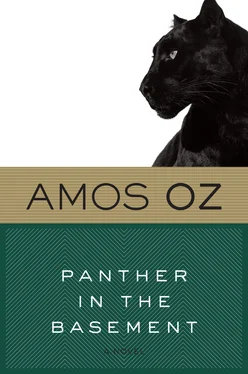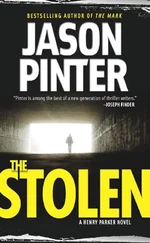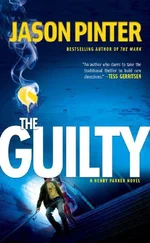At that moment I made up my mind to tell them:
"I'm done with Ben Hur and Chita. We're not friends any more."
Father had his back to us and his face to the piles of books that lay open on his dask. He asked:
"What have you done now? When will you learn to be loyal to your friends?"
I said:
"We've had a split."
Father turned in his chair and inquired in his self-righteous voice: "A split? Between the Sons of Light and the Sons of Darkness?"
And Mother:
"They're shooting out there in the dark again. It sounds close."
I have already mentioned how fascinated I am by people like Ben Hur, people who are always thirsty, whose unquenchable thirst gives them the drowsy cruelty of a wild cat — cool authority with half-closed eyes. And like the heroes of King David we studied in Bible class, I always feel a strange urge to put everything I have on the line for them. To risk my life fetching them water from enemy wells. All in the vague hope of hearing afterward from the corner of the leopard's mouth the magical words: "You're OK, Proffy."
There is another kind of people who enthralls me, apart from those thirsty leopards. On the face of it these people are the diametrical opposite of the leopards, but actually they do have something in common that is impossible to define but not hard to spot. I mean people who are always lost. Like Sergeant Dunlop, for instance. Both at the time I am writing about and now as I write, I have always found something poignantly endearing about lost people, who go through life as though the world is a bus station in a strange city, where they have got off by mistake and now have no idea where they went wrong or how to get away, or where to.
He was fairly broad and tall, a large pudgy man, but he was gentle. Rather cartilaginous. Despite his uniform and his gun, the sergeant's stripes on his sleeve, the glint of the silvery numbers on his shoulders, the black peaked cap, he looked like a man who has just come out of the light into the dark, or out of darkness into bright light.
He looked like a man who once lost something very precious, and now he can't remember what it was he lost, what it looks like, or what he would do with it if he found it. So there he was wandering in his own inner chambers, in the corridors, in the basement, in the storerooms, and even if he stumbled on whatever it was he had lost, how would he recognize it? He would walk wearily past and keep on searching. He would plod onward in his big boots, getting ever farther away and more lost. I did not forget that he represented the enemy, and yet I had a kind of urge to hold out a hand to him. Not to shake hands, but to support him. Like a baby, or a blind man.
Almost every evening I used to slink into the Orient Palace, with a copies of English for Overseas Students and Our Language for Immigrant and Pioneer under my arm. I no longer cared if the leopard and his sidekick were still trailing me along the alleys.
What more did I have to lose?
I quickly crossed the decadent front room, with its cigarette smoke and its stench of beer, ignoring the ribald laughter, restraining the urge of my fingertips to stroke the green baize of the billiard table, not seeing the barmaid's cleavage; in a straight line, with the determination of an arrow in flight, I sped into the back room and landed beside his table.
More than once I had come in vain; he was not there, even though we had made an arrangement. Sometimes he forgot. Sometimes he had got muddled. Sometimes when he finished his day's work in the accounts department he was suddenly sent on some outdoor assignment, standing guard by the post office or checking identity cards at a roadblock. And occasionally, so he hinted to me, he was confined to barracks because he had been slow in saluting or because one of his boots was shinier than the other.
Who has ever seen, in real life or in a film, a scatterbrained enemy? Or a shy one? Sergeant Dunlop was a scatterbrained and shy enemy. Once, I asked him if he had a wife or children waiting for him back home in Canterbury. (This was intended as an inoffensive way of hinting to him that the time had definitely come for the British to get out of our land, for their own good as well as ours.) Sergeant Dunlop was alarmed by my question, his heavy head withdrew into his shoulders like a startled tortoise, his big freckled hands scampering in confusion from his knees to the tabletop and back again, and then he turned red from his cheeks to his forehead and ears, like a wine stain spreading on a white tablecloth. He embarked on a lengthy apology in his rococo Hebrew: for the time being he "walked his path in solitude," even though the Good Lord had told us specifically in the Good Book that "it is not good for the man to be alone."
Sometimes I found Sergeant Dunlop waiting for me at his usual table, his shirttails hanging out of his trousers, his belly flopping over his belt and obscuring its shiny buckle, a slack, fleshy man. He might be playing himself at checkers, and on my arrival he would give a little start, apologize, and hurriedly put the pieces away in the box. He would say something like:
"Either way, I shall soon lose." And he would smile a sort of please-don't-take-any-notice-of-me smile, and halfway through smiling he would blush, and it seemed as though the blushing increased his embarrassment, and so redoubled itself.
"On the contrary," I said to him once, "either way, you will win."
He thought about this, got the point, and smiled sweetly, as though I had uttered a remark that was beyond the wisest philosopher. After thinking it over again he replied:
"Not so. In my victory I shall defeat myself."
Nevertheless, he agreed to play me, just once, and won, which filled him with rueful embarrassment. He started to apologize as though by beating me he had personally added to the crimes of the oppressive British régime.
Sometimes in the course of my English lessons he would apologize for the complicated tense system and the large number of irregular verbs. He seemed to be blaming himself and his sloppiness for the fact that English so often makes do with one word where Hebrew has two: for instance, one speaks of "a glass of water" and "a pane of glass"; "a dining table" and "a statistical table"; "a grizzly bear" and "to bear a burden"; "a hot day" and "a hot curry"; "to make a date" and "to eat a date." Whereas in his own Hebrew lessons, whenever he handed in the homework I set him, he would ask humbly:
"Well? A brutish man knoweth not? Neither doth a fool understand?"
If I praised his work, his childlike eyes would light up, and a modest, heartwarming smile would tremble on his lips before overflowing to his round cheeks; it seemed to spread all over his body under his uniform. He would murmur:
"I am not worthy of this praise."
But sometimes, right in the middle of a lesson, we would put our business on one side and talk. Sometimes he would get carried away and tell me all the barracks gossip, chuckling as though he was shocked by the naughtiness that was coming out of his mouth: who was undermining whose authority, who was hoarding candy or cigarettes, who never took a bath, who had been seen drinking in the bar with someone he claimed was his sister.
If we discussed the political situation, I became an angry prophet and he merely nodded and said "Indeed" or "Woe." Once he said:
"The people of the Prophets. The people of the Book. If only they could come to their inheritance without shedding innocent blood."
Sometimes the conversation turned to Biblical stories, and then it was my turn to listen open-mouthed while he amazed me with observations that our teacher Mr. Zerubbabel Gihon could not have contemplated in his wildest dreams. It emerged, for instance, that Sergeant Dunlop did not like King David, even though he felt sorry for him. His David was a village boy who was cut out to be a poet and a lover, but God made him king, which did not suit him, and condemned him to living a life of wars and intrigues. Small wonder that at the end of his life David was tormented by the same evil spirit that he himself had inflicted on his predecessor, Saul, who was a better man than he. In the end the two of them, the ass driver and the shepherd, suffered the same fate.
Читать дальше












